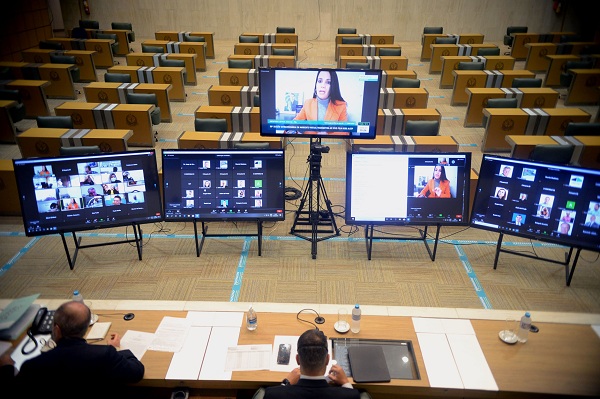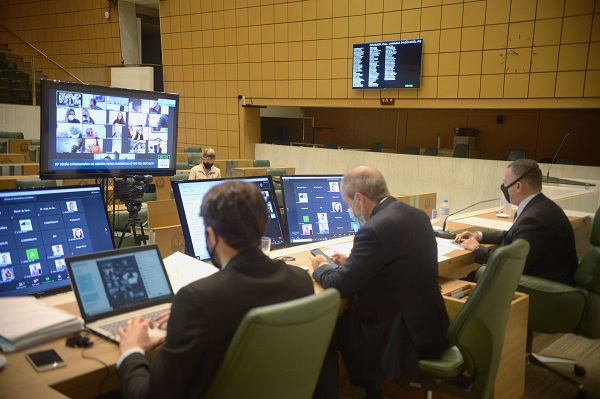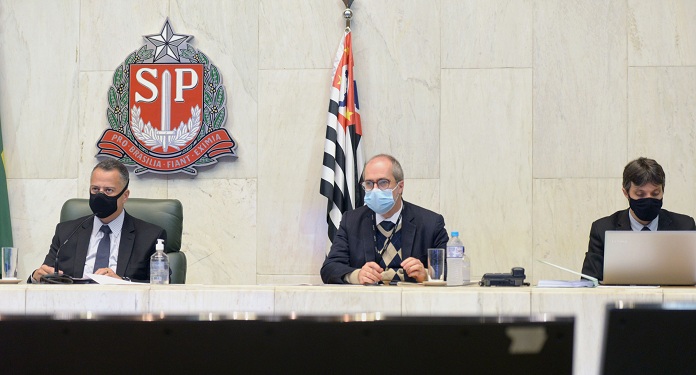The Legislative Assembly of the State of São Paulo ended, this Tuesday (22/6), the discussion stage and began the referrals for the method of voting of the Executive’s Bill 359/2021, which authorizes the realization of loans national and international, and the creation of the State Lottery, for works and investments of the 2022 Target Plan.
A new extraordinary session was called for this Wednesday, at 3 pm, to resume the referrals and proceed with the final vote on the proposal. If approved, it will proceed to the sanction of Governor João Doria.
The voting method, presented by the government leader, Vinicius Camarinha (PSB), includes two amendments, authored by Congresswoman Professora Bebel (PT), related to the transparency of the operations foreseen in the matter, such as publication of financing contracts and accountability to committees of the Legislative Assembly.
With the approval of the Assembly, the government will be allowed to contract loans of up to R$ 5 billion with national financial institutions. The amount obtained from credit operations should be distributed among works and investments in roads and localities, urban mobility, housing, infrastructure in health, education and public safety.
Actions aimed at the environmental area, flood drainage, innovation and new technologies for the optimization of public administration services complete the set of measures subject to the application of resources.

The government may also have access to up to US$ 256.5 million from the Inter-American Development Bank (IDB) to invest in the São Paulo Mais Digital project, aimed at modernizing public administration, increasing the scope of services provided and improving citizen services .
Another US$300 million dollars should be obtained for Sabesp’s Investment Plan Support Program, through an external credit operation with the New Development Bank (NDB). Another US$ 200 million dollars, acquired through the Japan International Cooperation Agency (Jica), will be earmarked for phase 3 of the Environmental Recovery Program for the Metropolitan Region of Baixada Santista.
The project also enables the creation of the São Paulo State Lottery as a way to increase the sources of funds for assistance actions and reduce social vulnerability in the State.
Finally, authorization is provided for the Finance Department to grant idle properties to the private sector so that the resources can be used in companies controlled by the State and in real estate or investment funds.
Discussion
Deputy Enio Tatto (PT) criticized the lack of detail and transparency in the project. According to him, every year the Parliament votes authorizations to make loans that are not always executed due to lack of planning. “Nobody is against loans, financing requests for a large state like São Paulo, which has so many demands, claims”, but “the Assembly approves and the government is unable to bring this money,” he said.
Sergeant Neri (Solidarity) agrees with Tatto’s analysis. For him, the difference between amounts requested by the government in loans and those actually used should be restricted to a safety margin of 5% to 10%. “Ideally, they spend what they need, or at least borrow what they really need, not subjectively, wanting to get high amounts and see what will be,” he said.

Barros Munhoz (PSB), on the other hand, who occupied positions in public administration at the municipal, state and federal levels, believes that this should not be the focus of the debate. “I don’t see any problem with you authorizing. You are authorizing an expense, if the person spends less, there is no problem at all,” stated the deputy.
Barros also emphasized that São Paulo needs these financings. “We are in a situation of great difficulty, much complication, there is no doubt that there is a federal barrier regarding the release of funds to São Paulo”, he added.
Processing
The project arrived at the Assembly on June 8th. Since then, it has been analyzed by the Constitution, Justice and Writing (CCJR) and Finance, Budget and Planning (CFOP) committees, before going to the Plenary on June 15, when it received two amendments and had to return for the commissions. The modification proposals were not accepted by the collegiate bodies and the government’s original text was kept. Now, with the plenary discussion finished, it goes to the final vote.





















































